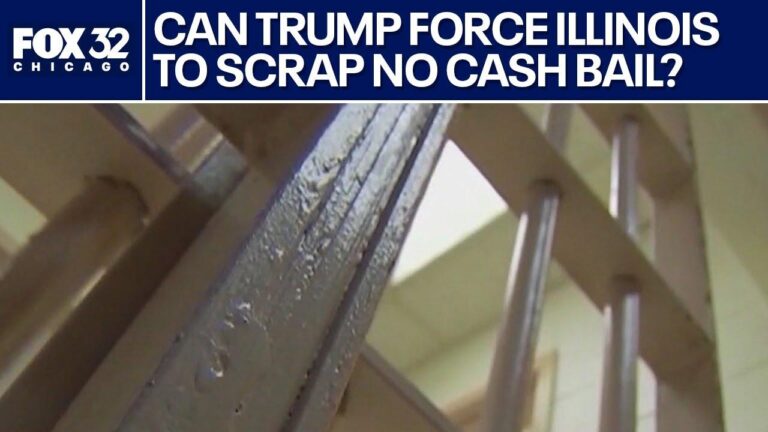Donald Trump’s Push to Repeal No Cash Bail in Chicago Amid Crime Surge
Trump’s Firm Opposition to No Cash Bail Policies in Chicago’s Crime Debate
Former President Donald Trump has reignited controversy surrounding Chicago’s criminal justice reforms by vocally opposing the city’s no cash bail system. Linking this policy to a rise in violent offenses, Trump has pledged to dismantle no cash bail if given the opportunity, asserting that releasing suspects without financial stakes undermines public safety. His comments come as Chicago faces a troubling increase in shootings and homicides, intensifying the clash between advocates for law enforcement and proponents of reform.
While critics warn that reinstating cash bail could disproportionately harm economically disadvantaged and minority populations,Trump and his supporters argue that tougher measures are essential to deter repeat offenders and restore order. Key elements of Trump’s position include:
- Reinstating financial accountability: Ensuring defendants have a monetary incentive to appear in court.
- Strengthening law enforcement authority: Advocating for harsher sentencing to curb criminal activity.
- Prioritizing victim protection: Emphasizing community safety over leniency in judicial rulings.
| Policy Area | Trump’s Viewpoint | Chicago Officials’ Perspective |
|---|---|---|
| No Cash Bail | Opposed – believes it encourages crime | Supported – aims to reduce jail overcrowding |
| Crime Trends | Rising due to lenient policies | Attributed to socioeconomic factors |
| Judicial Reform | Supports stricter enforcement | Focuses on rehabilitation and equity |
Examining the Effects of Cash Bail Reforms on Justice and Public Safety
The shift toward eliminating cash bail has sparked intense discussion about its real-world consequences on community safety and fairness in the justice system. Opponents of no cash bail argue that releasing defendants without financial conditions can increase the likelihood of missed court dates and repeat offenses. Conversely, supporters highlight that cash bail systems often penalize poverty, disproportionately affecting marginalized groups and perpetuating cycles of incarceration.
Data from jurisdictions that have adopted bail reforms reveal a complex landscape:
- Decline in jail populations: Many areas report notable reductions in pretrial detention, alleviating overcrowding.
- Improved court compliance: Enhanced notification systems and supervision have led to higher rates of court appearances.
- Varied crime outcomes: Some cities see stable or falling crime rates, while others experience increases, making it difficult to isolate bail policy as the sole factor.
| Indicator | Before Reform | After Reform |
|---|---|---|
| Jail Population | 15,000 inmates | 10,500 inmates |
| Failure to Appear Rate | 25% | 18% |
| New Offence Rate Post-Release | 8% | 12% |
Political Divides and Public Sentiment on Trump’s Crime Policy Proposals
Trump’s call for a stringent crackdown on crime and the abolition of no cash bail has sharply polarized political and public opinion. Republican leaders have largely endorsed the initiative, framing it as a necessary step to restore law and order in cities like Chicago. They emphasize accountability and swift justice as critical to deterring criminal behavior. In contrast, Democrats and criminal justice reform advocates warn that such policies risk deepening mass incarceration and disproportionately harming minority communities. They advocate for addressing root causes of crime through social programs and balanced reforms.
- Republican backing: Focus on public safety, deterrence, and victim rights.
- Democratic resistance: Concerns over civil liberties, racial equity, and systemic reform.
- Public opinion: Divided along demographic and geographic lines, reflecting varied priorities.
| Demographic Group | Level of Support | Main Concern |
|---|---|---|
| Conservative Voters | Strong | Crime prevention and deterrence |
| Progressive Voters | Weak | Justice reform and equity |
| General Population | Mixed | Balancing safety with civil rights |
Strategies for Harmonizing Public Safety and Equitable Justice in Chicago
Effectively addressing Chicago’s crime challenges demands a balanced approach that protects communities while ensuring fairness in the judicial process. One promising method is the adoption of risk-based assessment tools in pretrial decisions, which evaluate defendants’ likelihood of reoffending or fleeing rather than relying solely on financial conditions.When implemented with accuracy and clarity, these tools can minimize unnecessary detentions and focus resources on high-risk individuals.
Additional recommendations to promote justice and safety include:
- Increased investment in public defender offices to guarantee quality legal portrayal for all defendants.
- Enhanced data tracking to monitor bail outcomes and identify disparities or unintended consequences.
- Community policing programs that foster collaboration and trust between law enforcement and residents.
| Initiative | Goal | Illustrative Example |
|---|---|---|
| Risk Assessment Tools | Limit unnecessary pretrial detention | Algorithm-based scoring of defendant risk |
| Public Defender Support | Ensure fair legal defense | Expanded staffing and training programs |
| Community Engagement | Build trust and reduce crime | Neighborhood liaison and outreach initiatives |
Conclusion: Navigating the Future of Crime Policy in Chicago
As national conversations around criminal justice reform intensify,former President Trump’s commitment to abolishing no cash bail and enforcing a stringent crime crackdown in Chicago introduces a contentious dynamic to the debate. With the city confronting persistent violence and public safety concerns, his proposals are poised to spark vigorous discussion about how best to balance reform efforts with effective law enforcement. The ultimate impact of these initiatives on Chicago’s policies and communities remains uncertain, as local leaders and residents weigh the potential advantages and drawbacks. Ongoing coverage will track these developments closely.





